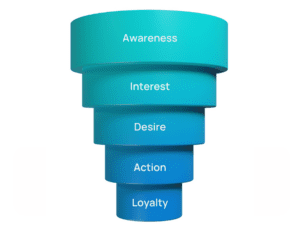
Do you remember Alec Baldwin’s iconic line “Always Be Closing” from the movie Glengarry Glen Ross?
While it resonates with sales teams to this day, it paints an incomplete picture of the customer journey. There were actually two acronyms on the board in that scene, the other being AIDA. Not quite as catchy as ABC, but a good starting point for the customer journey.
AIDA stands for Awareness, Interest, Desire, and Action. It’s a framework that describes the stages a customer goes through from being aware of a product or service to making a purchase decision. Understanding this journey can help businesses build better relationships with their customers and ultimately improve their reputation.
The AIDA framework implies a linear progression – if we can capture Attention and Interest at the right time, create Desire in our potential customers, and make it easy for them to take Action – then we have successfully completed the buyer’s journey.
However, as said above, it’s just a starting point. We find that in reality, the customer journey is more nuanced. The AIDA model, while valuable for understanding the core stages, fails to capture the complexities of how modern consumers navigate the journey. That’s why we recommend using a customer-centric perspective instead.
Let’s dive deeper into the customer-centric perspective and explore how reputation significantly impacts their decisions, particularly in the crucial Desire stage before they take Action.
 Beyond the Linear Funnel: Understanding the Customer Journey
Beyond the Linear Funnel: Understanding the Customer Journey
As mentioned, the traditional AIDA model (Attention, Interest, Desire, Action) paints a linear picture of the buyer’s journey. But modern consumers don’t usually follow a straight path. They enter, leave, and re-enter the funnel at their own pace, researching and comparing options before committing.
Imagine a leaky, non-linear maze instead of a neat funnel. This better represents how customers enter, leave, and revisit various stages at their own pace, sometimes lingering in the “problem awareness” or “interest” phases for extended periods before taking action.
It’s tempting to view this journey through a company-centric lens, focusing on stages like “awareness of our product” and “desire for our service.” That’s how the traditional AIDA framework has often been viewed.
What a Customer-Centric Approach Looks Like
However, a customer-centric approach offers a more valuable perspective:

- Awareness: They recognize they have a problem, but solutions remain unclear.
- Interest: They actively research ways to solve their problem.
- Desire: They identify potential solutions and shortlist options.
- Action: They choose a solution and become a customer.
- Loyalty: They remain satisfied and continue using the chosen solution.
By shifting our perspective, we understand that our company is just one option among many for customers. The journey isn’t about self-promotion; it’s about helping potential clients solve their problems in the best way possible. This customer-centric approach, while seemingly subtle, can have a transformative impact on your business.
Now, what does this have to do with reputation?
The Desire Stage: Where Reputation Shines, But Doesn’t Solely Decide
Imagine a property owner facing a challenging tenant situation. They’ve finally decided to seek professional help (Desire stage).
This is where reputation matters the most. It’s how they’ll decide which property management company to call first.
The owner’s journey starts with a basic online search, like “property managers near me.” This generates various results, including ads and Google Local.
At this stage, the owner is going to start clicking on business profiles and reading reviews.
There are so many different company profiles and they’re not going to sit there, clicking every single one. They’ll explore individual profiles and delve into reviews, encountering the “review roulette”:
- A company with a perfect 5-star rating but limited reviews.
- A company with a slightly lower 4.7-star rating but 100 reviews.
- A company with a 4.5-star rating and 400 reviews.
Which one should they call? They’ll have to use their gut to figure out what ratio of average star rating and number of reviews they feel is good enough to justify further exploration. Each scenario presents a unique picture, and the owner must weigh perceived reputation based on the available information.
Eventually, they’ll find a way to overcome this mental challenge and end up with a shortlist of companies worthy of further inspection.
Decoding the Shortlist: How Owners Evaluate Property Management Companies
Having narrowed down their options, owners embark on a deeper evaluation of shortlisted property management companies:
Scrutinizing the Details: They meticulously examine each company profile, considering:
- Years in business: Established companies often inspire greater trust.
- Review recency: Recent reviews offer insights into current performance.
- Review content: Both positive and negative reviews provide valuable information. (Seeking out negative reviews can reveal potential downsides and how the company handles challenges.)
Examining Responses: They analyze how companies respond to reviews, gauging their:
- Customer service approach: Professional and prompt responses build confidence.
- Engagement with feedback: Addressing both positive and negative reviews demonstrates commitment to improvement.
Expanding the Investigation: Your online reputation goes far beyond star ratings. It encompasses all aspects of your online presence, including reviews, responses, website content, and broader search results. This holistic image significantly influences prospective customers’ perception and ultimately guides their decision-making.
 Building Trust and Standing Out: Actionable Steps for Property Managers
Building Trust and Standing Out: Actionable Steps for Property Managers
Your online presence significantly impacts how potential customers perceive your property management company, and influences them along their customer journey. Here are actionable steps you can take to build trust, stand out from the competition, and attract property owners in the crucial Desire stage:
Regularly Monitor and Manage Your Online Reputation
To actively manage your online reputation, set up alerts to stay informed about online mentions, reviews, and social media conversations. This allows you to respond promptly and professionally to both positive and negative feedback. When responding, acknowledge concerns, express gratitude for feedback, and aim to reply within 24-48 hours, showcasing your commitment to excellent customer service. Be transparent and professional in your responses, acknowledging any mistakes and outlining steps taken to address the concerns raised. This demonstrates your dedication to providing exceptional service.
Encourage and Address Customer Reviews
To cultivate a strong online reputation, actively solicit positive reviews from satisfied clients on platforms like Google My Business, Yelp, and relevant industry websites. This strengthens your credibility and visibility. We’ll talk more about asking for and responding to reviews in future parts of this series.
Maintain a Professional and Informative Website
Don’t underestimate the impact of your website on your online reputation. Investing in a user-friendly design is crucial, ensuring it’s easy to navigate and accessible across various devices, like desktops, tablets, and smartphones. This allows potential clients to seamlessly access information and connect with your company. But your website shouldn’t just look good; it should provide valuable content. Offer informative content that showcases your expertise, such as blog posts addressing common property management concerns, FAQs, and downloadable resources like tenant handbooks or guides to local regulations. Finally, don’t be afraid to highlight your unique selling proposition (USP). Clearly communicate what sets your company apart from the competition, whether it’s specialized services, competitive pricing, or a commitment to sustainability.
 Conclusion: Cultivating an Online Presence that Converts
Conclusion: Cultivating an Online Presence that Converts
The customer journey isn’t a linear path, but a complex maze where reputation plays a critical role, especially in the crucial Desire stage. As potential property owners research and evaluate options, your online presence becomes a key battleground.
Remember, star ratings are just one piece of the puzzle. They might initially grab attention, but a holistic online reputation encompassing reviews, responses, website content, and broader search results ultimately shapes prospective customers’ perception.
By taking actionable steps like:
- Regularly monitoring and managing your online reputation
- Encouraging and addressing customer reviews in a professional manner
- Maintaining a professional and informative website
You can build trust, stand out from the competition, and position your company as the clear choice for property owners seeking reliable and trustworthy partners.
So, take charge of your online narrative today, and watch your business thrive in the ever-evolving digital landscape! By embracing a customer-centric approach and focusing on building a strong online reputation, you can transform the way potential clients perceive your property management company and ultimately convert them into loyal customers.
Tune in soon for part 2: “What Consumers Care About Reviews”.

 Beyond the Linear Funnel: Understanding the Customer Journey
Beyond the Linear Funnel: Understanding the Customer Journey Building Trust and Standing Out: Actionable Steps for Property Managers
Building Trust and Standing Out: Actionable Steps for Property Managers Conclusion: Cultivating an Online Presence that Converts
Conclusion: Cultivating an Online Presence that Converts